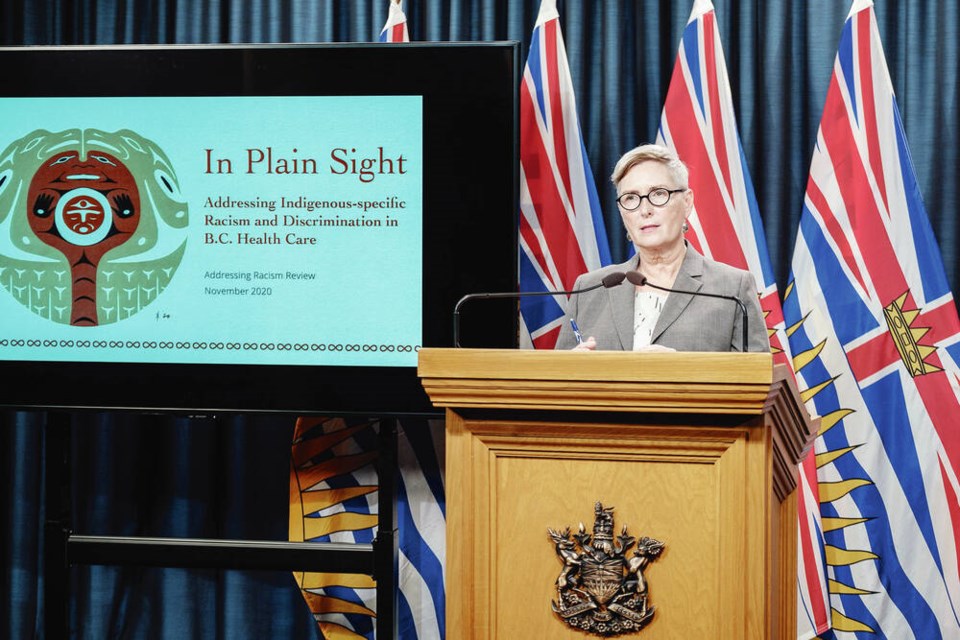Fewer than half of the 24 recommendations to address Indigenous-specific racism in the province’s health-care system have been fully implemented on the one-year anniversary of the In Plain Sight report, its author said Tuesday.
“I continue to receive disturbing complaints about racism occurring at the point of care and about the ongoing inadequacy of complaints processes,” said Mary Ellen Turpel-Lafond.
Turpel-Lafond, a retired judge, was asked in June 2020 to investigate allegations that health-care professionals at Saanich Peninsula Hospital played a “game” where they guessed Indigenous patients’ blood alcohol levels. The investigation found no evidence to substantiate the allegations.
However, the report, called In Plain Sight: Addressing Indigenous-specific Racism and Discrimination in B.C. Health Care, details hundreds of other examples of racism and profiling resulting in poorer health outcomes for First Nations and Métis people. It found “widespread interpersonal and systemic racism oppressing Indigenous Peoples in B.C.”
The result has been “lasting mistrust and fear of the health-care system” among Indigenous people, said Turpel-Lafond, who made 24 recommendations aimed at eliminating Indigenous-specific racism and creating equity in health-care experiences, services and outcomes.
Turpel-Lafond said she’s been “closely” monitoring progress: apologies issued by health system leaders and regulatory bodies, a critical amendment to the B.C. Human Rights Code to include Indigenous identity as a protected ground from discrimination, and the hiring of Indigenous senior leaders across health authorities and the Health Ministry to lead change from the inside.
At Saanich Peninsula Hospital, an Indigenous patient navigator was hired for Indigenous patients seeking emergency services.
But much more work is needed, Turpel-Lafond said.
“Instead, much of the past year has been spent trying to figure out who sits on what committees,” she wrote in her one-year update. “In the meantime, Indigenous Peoples have continued to be disproportionately harmed and oppressed, and they continue to die as a result of the impacts of racism and the twin public health emergencies.”
Turpel-Lafond said the province has not used available tools to uphold obligations under the Declaration on the Rights of Indigenous Peoples Act to address anti-Indigenous racism as it relates to the right to health — including the right to traditional medicines, access without discrimination to health and social services.
Turpel-Lafond is calling on the province to complete implementation of the recommendations and respond better to the impacts of public health emergencies on Indigenous Peoples, support a broader movement to “speak up” against racism in health care, and include First Nations as partners in all new health capital projects.
A momentous review like In Plain Sight demands accountability for the Indigenous patients, residents and families who shared their stories, said Turpel-Lafond.
First Nations, Métis, and provincial government leaders have endorsed the report, “yet ineffective collaboration has slowed improvement where it is needed the most,” she said.
Health Minister Adrian Dix said Tuesday the one-year anniversary of the report “marks an important moment” and a time to recommit to the eradication of racism in health care.
Dix reiterated important first steps taken, including a public apology for Indigenous-specific racism and the appointment of Dawn Thomas to the role of acting associate deputy minister, Indigenous Health, but acknowledged there is more work to do.
The province remains “absolutely committed to implementing all 24 recommendations of In Plain Sight,” he said, “and we will continue to work together with Indigenous Peoples, all orders of government, health-system partners, individuals, service providers, regulatory bodies and health-system leadership to make this commitment a reality.”



